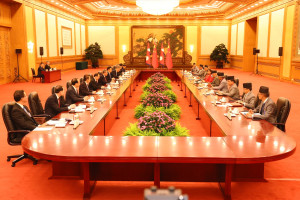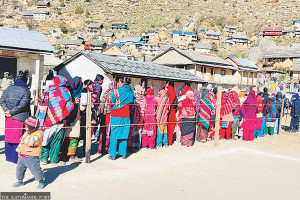National
Government yet to ready 39 bills needed for constitution’s full implementation, according to upper house subpanel
Dozens of Acts from the Panchayat era are still in effect today, reflecting government indifference in aligning laws to present-day needs.
Post Report
Nine years since the new constitution came into force, the government is yet to prepare more than three dozen laws needed for its effective implementation.
A subpanel under the Legislation Management Committee of the National Assembly has found that different ministers still need to ready 39 bills necessary for full-fledged implementation of the statute. Submitting its report to the committee, the Beduram Bhusal-led five member subpanel has pointed out that successive governments have paid little attention towards ensuring necessary legal arrangements for the constitution’s full-fledged implementation. Seven governments led by Nepali Congress, CPN-UML and CPN (Maoist Centre) have been formed since the promulgation of the constitution in 2015.
“No serious attention has been given in having necessary legal arrangements to implement the constitution promulgated nine years back,” Gopal Bhattarai, a member of the Busal-led subpanel, told the Post. He said the highest number of bills—13—are related to the Ministry of Law, Justice and Parliamentary Affairs followed by the Office of the Prime Minister, and the Ministry of Home Affairs with eight and four, respectively.
The committee, after a similar study last year, had found that only 111 laws among the 151 required to implement the 2015 constitution had been enacted by July 2023. It had pointed out that 40 Acts needed either major amendments or replacement to sync them with the constitution.
Appearing before the upper house, then prime minister Pushpa Kamal Dahal had said the government was serious about drafting the necessary bills and registering them in the federal parliament. But his government failed to walk the talk. The incumbent government has not either made serious attempts to introduce these necessary bills.
“However, only one bill related to constitution implementation was registered after his [Dahal’s] commitment,” said Bhattarai. “Starting next week, we will invite ministers and officials from the respective ministries to discuss why haven’t the bill been readied yet and how long it would take.”
The constitution had set two deadlines to prepare laws for its implementation. It mandated the passage of laws related to fundamental rights within three years of the charter’s promulgation. The federal parliament endorsed the bills related to 31 fundamental rights a day before the constitutional deadline of September 19, 2018.
As per the statute, the Acts that contradict the constitution must have been revised within a year since the first meeting of the federal parliament on March 5, 2018. Though several laws were enacted, dozens are still awaiting parliamentary approval.
One major constitutional mandate involves devolving authority to manage school education from the federal government to local governments. However, the federal education law has yet to be enacted. Similarly, the federal civil service bill is also stuck in a parliamentary committee.
Other crucial laws, including those related to health, citizenship and the authority of the President and Vice President, have also not been enacted yet.
The report says that some of the laws in force date back as far back as 1953. Similarly, dozens of Acts are from the Panchayat era (1961-1990). For instance, the Education Act from 1972 and Infectious Disease Act from 1962 remain in force even today.
In its report, the House committee had instructed the government to revise the Panchayat-era laws to align with the present-day needs. However, little progress has been made in this regard.
It is the government that prepares bills and registers them in Parliament. They become Acts only after they get through both the houses of the federal parliament and receive the Presidential seal.
However, delays on the part of the parliament and the parliamentary committees in finalising the bills after deliberations are also responsible for the delay in having the necessary laws. Several of the 16 bills with different parliamentary committees are pending for more than a year.




 5.12°C Kathmandu
5.12°C Kathmandu













